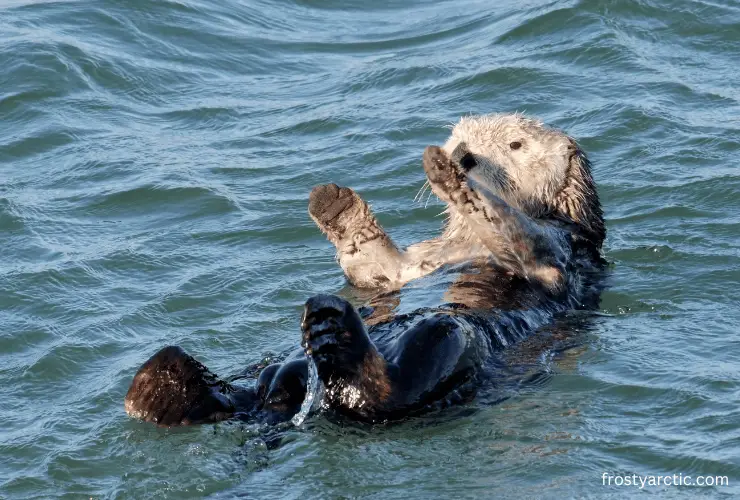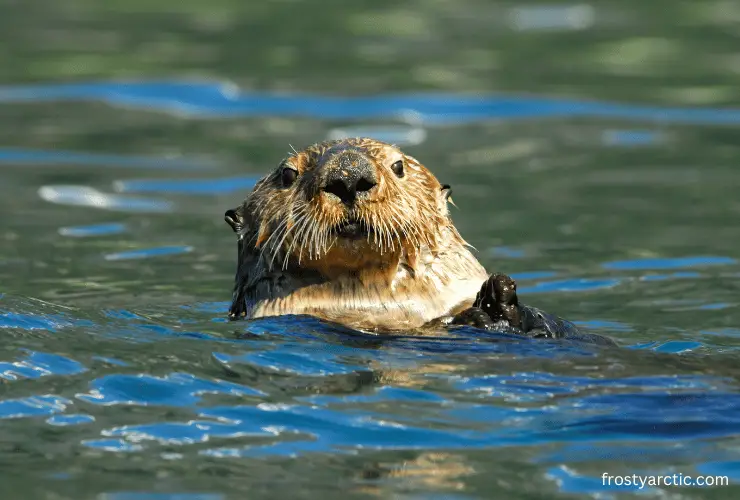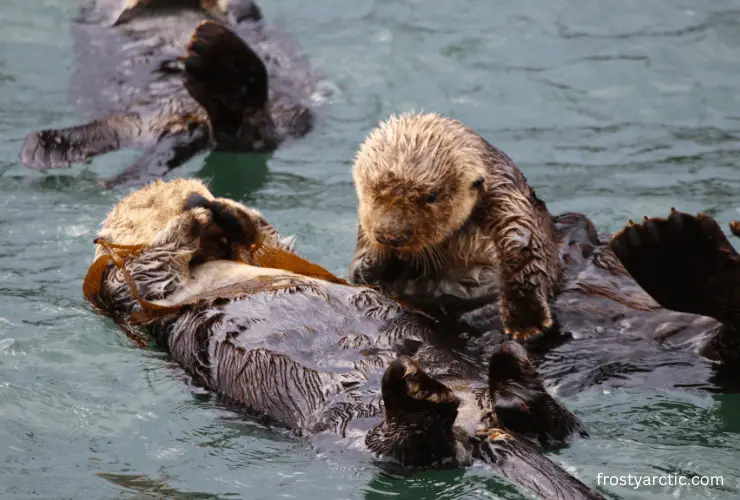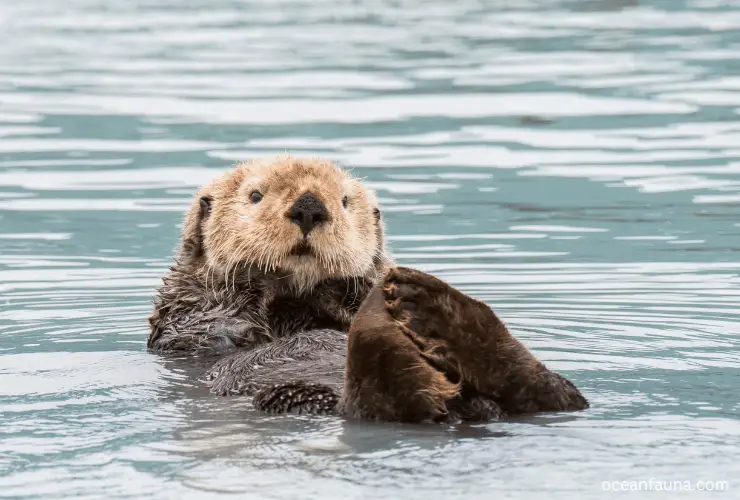Sea otters are important for maintaining marine ecosystem health. By controlling sea urchin populations, they prevent excessive grazing on kelp forests, which helps promote biodiversity. These thriving kelp forests provide essential habitats for numerous marine species.
Sea otters also aid in carbon absorption by protecting kelp forests, indirectly combating climate change.
Why are sea otters considered the ‘keystone’ species? To fully grasp their significance, imagine a thriving marine world full of a variety of species, from colorful fish to towering kelp forests. This biodiversity hotspot is largely maintained by the actions of one creature — the sea otter.
Their role goes beyond being adorable animals; they are guardians of their ecosystems. They influence everything from the survival of kelp forests to the cycling of crucial nutrients. So, let’s dive into the world of sea otters and explore why their presence is so crucial.
Why are Sea Otters A Keystone Species?
A keystone species has a vital role in keeping an ecological community well-balanced. It has a bigger impact on its environment than we would normally expect from its numbers or size.
The sea otter perfectly embodies this concept. Without these creatures, ecosystems can fail or drastically transform. ~ Source
● Sea Otters as Defenders of Kelp Forests
Sea otters have a huge impact on the marine ecosystems they inhabit. They are also often called the ‘defenders of kelp forests.’ This is due to their dietary preference for sea urchins, a major consumer of kelp.
A study published in Frontiers in Ecology and Evolution indicates that in the absence of sea otters, unchecked sea urchin populations can lead to ‘urchin barrens”—areas devoid of kelp where urchins have overgrazed. Sea Otters’ predation on urchins helps maintain the balance and ensure the survival and health of kelp forests.
● Maintaining Kelp Forest Biodiversity
The role of sea otters extends beyond the protection of kelp forests; it affects marine biodiversity as a whole. Kelp forests serve as habitat for numerous species, from fish to invertebrates. By defending kelp forests, sea otters indirectly support a wide range of marine life, contributing to more diverse and resilient ecosystems.
A study published in “Frontiers in Ecology and the Evolution” highlighted the crucial role of sea otters. It states that the absence of sea otters could lead to the disappearance of kelp forests, adversely affecting marine biodiversity.
● Influencing Nutrient Cycling

Sea Otters also play a vital role in nutrient cycling. They expose lower layers to the water column by stirring up the sediments, effectively redistributing nutrients throughout the sediment layers.
Moreover, this disturbance helps oxygenate the sediment, which benefits the microbial processes that drive nutrient transformations.
The excretion of sea otters is another way they contribute to nutrient cycling. After consuming their prey, sea otters excrete waste products that are rich in nitrogen and phosphorus.
When these nutrients are released back into the water, they can stimulate the growth of phytoplankton and seaweed, which form the base of the marine food web.
● Aiding in Carbon Sequestration
Kelp forests, the ocean’s most efficient carbon sinks, absorb significant amounts of CO2 from the atmosphere. By promoting the health and survival of these forests, sea otters play a crucial role in this natural process.
Research from the Aleutian Islands has shown that ecosystems inhabited by sea otters can be 3–4 times more productive. This increased productivity is largely due to the enhanced carbon intake from the kelp forests that sea otters help protect.
● Decreases Coastal Erosion
Sea otters contribute to reducing coastal erosion by protecting kelp forests, which act as natural buffers against wave impacts. When sea urchins overgraze on kelp, the absence of these important vegetation coverings can lead to increased erosion along coastlines.
Studies found that areas with thriving sea otter populations experienced lower rates of coastal erosion than areas with depleted sea otter populations. By maintaining the health of kelp forests, sea otters indirectly help safeguard coastal ecosystems.
● Barometers of Ocean’s Health
Sea otters serve as reliable indicators of the overall health of coastal marine ecosystems. Their proximity to the coastline and specific behaviors make them effective “barometers” for scientists studying ocean health. Diseases and parasites that sea otters acquire can provide valuable insights into the presence and impact of local pathogens.
Research published in the journal “EcoHealth” emphasizes the importance of monitoring sea otter health as an indicator of coastal ecosystem well-being. By studying sea otters, scientists gain crucial information about the status of marine health and can take appropriate conservation measures.
● Top-Down Control
Furthermore, sea otters are crucial to the structure of their ecosystems as secondary consumers. They implement a ‘top-down’ control in the food chain, meaning that their consumption of certain organisms, like sea urchins, can boost the populations of organisms at lower trophic levels.
For example, by eating large amounts of sea urchins, sea otters allow the kelp that urchins feed on to grow in greater numbers and density.
This positive influence can be seen clearly in places like the Elkhorn Slough. Here, the presence of sea otters has led to flourishing eelgrass beds. This abundance of eelgrass is helping offset the harmful effects of excessive nutrients in the slough. ~ Source
● Regulators of Trophic Interactions
According to an article published in Science, sea otters’ predation on sea urchins and other invertebrates influences the trophic dynamics within marine ecosystems. This predatory behavior helps balance species composition and distribution, creating a more stable ecosystem.
For example, in the kelp forests of the central and western Aleutian Islands, the population of rock greenling fish (Hexagrammos lagocephalus) tends to flourish. In fact, these fish are found to be ten times more abundant in kelp forests as compared to sea urchin barrens. ~ Source
These examples underscore the critical role sea otter predation plays in maintaining balanced ecosystems.
What Species Benefit from Sea Otters?

Sea otters’ role as keystone species has far-reaching effects on various organisms in the marine ecosystem. Their behavior and diet significantly benefit multiple species.
● Sea Birds and Fishes
Without sea otters, unchecked sea urchin populations can devastate kelp forests. Kelp forests provide important nesting and feeding grounds for a variety of sea birds and serve as nurseries for many types of fish.
By controlling urchin numbers, otters indirectly aid in the survival and growth of these avian and aquatic populations, as reported by the COSEWIC.
● Invertebrates and Other Marine Species
Other invertebrates, such as sea stars and shellfish, can thrive because sea otters prey on sea urchins. These species often compete with urchins for food and space. With sea otters controlling the urchin populations, the competition is lessened, leading to a more diverse undersea community.
● Kelp and Other Seaweeds
Kelp, which forms the basis of underwater forests, significantly benefits from the presence of sea otters. Kelp forests, which would be decimated by overgrazing urchins in the absence of sea otters, can grow dense and healthy, providing shelter and food for countless marine organisms.
Why are Sea Otters Important to Humans?

Sea otters’ importance extends beyond their immediate marine environment, offering substantial benefits to humans as well. These benefits primarily stem from the sea otters’ role in maintaining ecological balance, consequently influencing various aspects of human life.
● Supporting Fisheries
Sea otters play a crucial role in sustaining healthy kelp forests, which serve as nurseries for many species of economically important fish.
A study published in “Frontiers in Marine Science” revealed that the presence of sea otters can lead to larger and more abundant fish populations, which in turn can support more productive fisheries.
Furthermore, by supporting kelp forest ecosystems and fish populations, sea otters indirectly contribute to the jobs and livelihoods dependent on these fisheries.
According to a report from the National Oceanic and Atmospheric Administration (NOAA), commercial and recreational fishing in the United States supports over 1.7 million jobs, demonstrating the broad-reaching implications of healthy marine ecosystems.
● Climate Change Mitigators
By controlling sea urchin populations and promoting healthy kelp forests, sea otters indirectly aid in the fight against climate change.
Kelp forests absorb CO2 from the atmosphere for photosynthesis, effectively reducing greenhouse gases. This positively impacts our environment. According to a study, conducted in the North Pacific kelp forests, sea otters’ presence can absorb up to 12 times more carbon dioxide.
Besides kelp forests, sea otters also positively impact seagrass meadows, which in turn help combat climate change.
Seagrass, similar to kelp, captures carbon during its growth and stores a large portion of it in its roots. When these older roots die off, the carbon they stored gets trapped in the sediment. This process can lock away carbon for centuries, preventing it from returning to its gaseous state and contributing to greenhouse gases. ~ Source
A study by the University of California, Santa Cruz, estimated that sea otters’ contribution to carbon sequestration could be worth as much as $700 million on the European carbon market.
● Eco-Tourism Boosters
Sea otters are a significant draw for the ecotourism industry. Their playful antics and furry appeal attract tourists, benefiting local economies.
Recent research by the Monterey Bay Aquarium and the Middlebury Institute of International Studies Center for the Blue Economy discovered that sea otters draw recreational tourists to Elkhorn Slough. This influx of tourists brings in more than $3 million in revenue to the local communities yearly.
This research, published in the Journal of Coastal and Ocean Economics, evaluated the economic impact of tourists visiting Elkhorn Slough. This central Californian estuary is a hotspot for outdoor activities such as kayaking, hiking, and fishing.
The researchers found that the chance to watch sea otters significantly enhances visitors’ enjoyment of the area. This enthusiasm for sea otter viewing aligns with the monetary value visitors are willing to attribute to protecting the region and its sea otter population.
FAQs
Q: What would happen if sea otters went extinct?
A: If Sea otters went extinct, the balance of their marine homes would collapse. There would be lots of sea urchins, who would then eat lots of kelp. This loss would affect many sea animals and plants, worsen climate change, and even impact local economies that depend on sea otter tourism. In short, a world with sea otters would be healthier and more diverse.
Q: Do Sea otters play a role in maintaining water quality?
A: Yes, sea otters indeed contribute to maintaining water quality. A study showed that sea otters help protect the underwater ecosystem of Elkhorn Slough by eating crabs.
This indirectly helps counteract the harmful effects of agricultural runoff, which can introduce pollutants into the water. By consuming crabs, sea otters help restore balance in the ecosystem, reducing the impact of these pollutants. ~ Source
Wrapping Up
So, why are sea otters important for the ecosystem? Sea otters are critical to preserving kelp forests, an essential pillar of coastal marine ecosystems. Their relationship with these forests is symbiotic and central to the health and balance of marine life.
In an indirect yet significant way, sea otters also aid in carbon sequestration. The flourishing kelp forests, protected by sea otters, are excellent at absorbing CO2 from the atmosphere, aiding our fight against climate change.
Moreover, sea otters generate substantial economic value by fostering vibrant marine life and supporting our fishing and ecotourism industries. Therefore, protecting sea otters is about more than just biodiversity; it is about our planet’s health and well-being. We hope you enjoy reading our blog. Stay tuned for more otter-ly-filled adventures.



1 thought on “Why Are Sea Otters Important?”